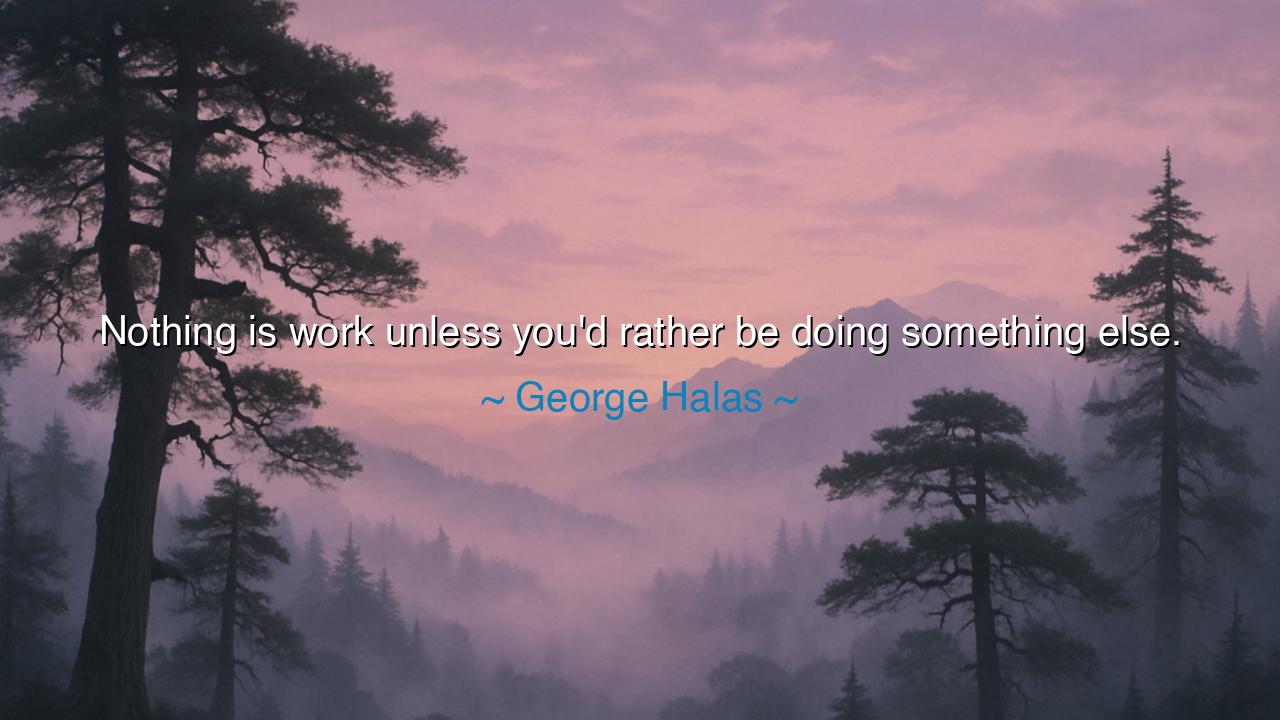
Nothing is work unless you'd rather be doing something else.






Hear the words of George Halas, founder, builder, and master of the game, who proclaimed: “Nothing is work unless you’d rather be doing something else.” In this saying lies the eternal secret of joy—that work itself is not measured by burden, but by the spirit with which it is embraced. When the heart is aligned with the task, labor becomes delight, and duty becomes freedom.
To call something work is to name it heavy, unwanted, a chain upon the will. Yet Halas reminds us that this heaviness exists only when the soul longs to be elsewhere. If the mind and heart are fixed upon another desire, the present task feels like bondage. But if the task itself stirs passion, if the soul delights in the doing, then even toil and sweat are no longer work, but play, devotion, and art.
This wisdom springs from the life of Halas, who gave himself fully to football—not only as player but as coach, builder, and guide. His life was consumed in the game, yet he found in it no prison, but purpose. For him, the endless hours, the discipline, the effort were not a weight to carry, but a joy to live. His saying reminds us that the true burden of labor lies not in the body, but in the heart’s reluctance.
The ancients too knew this truth. They taught that the potter who loves the clay, the farmer who loves the field, and the poet who loves the word, do not work but live in harmony with their nature. The plow, the wheel, the pen—all these become extensions of joy when the laborer’s spirit is one with the task. Only when love departs does labor harden into chains.
Thus let the teaching endure: seek that which awakens your soul, and then even the hardest toil will not feel like work. But if your heart is absent, even the easiest task will weigh like stone. Halas’ words call across generations: find your passion, embrace it, and you will never labor, but only live.






VATran Van An
This quote made me realize how much of our experience of ‘work’ depends on our mindset. If you’re deeply interested in what you do, it’s not work—it’s fulfilling. But what about those times when you have to do something you’re not passionate about? Do you think there’s value in learning to find meaning or joy even in tasks we don’t love, or is it important to acknowledge that some things will just always feel like work?
THThu Huong
Halas’ quote highlights the importance of enjoying what we do, but it also raises a question about obligation. There are always tasks in any job or role that we’d rather not do, but they’re still essential. Can we truly eliminate the concept of work if we love what we do? How do we reconcile the idea of ‘work’ with the necessity of fulfilling responsibilities that don’t necessarily excite us?
QAQuynh Anh
This quote makes me reflect on how much attitude impacts our perception of work. It’s true that when we’re doing something we love, it doesn’t feel like work at all. But how do we deal with the times when we have to do things that aren’t particularly enjoyable but are necessary? Is there a way to bring more passion into those moments, or do we just need to accept that work sometimes feels like work?
NTKhanh Ngan Tran
I like how this quote challenges our conventional view of work. Often, we think of work as something tedious, but Halas suggests that it’s only work when we’d rather be doing something else. But how do we maintain that sense of purpose when the tasks become mundane? Can we shift our mindset to make everything we do feel meaningful, or do we have to accept that not everything will be enjoyable?
DV49. Duc Vinh
George Halas’ words suggest that the line between work and leisure is really about perspective. If you love what you’re doing, it’s no longer work, it’s a passion. But is it realistic to expect that we can always find passion in our daily tasks? Or is work sometimes just work, and that’s okay? How do we balance the desire to feel ‘fulfilled’ with the reality of life’s obligations?